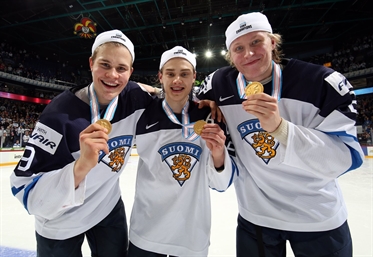Best lines in WJC history
Best lines in WJC history
Who shone brightest for hockey’s biggest powers?

 Jesse Puljujarvi, Sebastian Aho and Patrik Laine keyed Finland's dramatic run to gold at the 2016 World Juniors in Helsinki. Photo: Andre Ringuette / HHOF-IIHF Images
Jesse Puljujarvi, Sebastian Aho and Patrik Laine keyed Finland's dramatic run to gold at the 2016 World Juniors in Helsinki. Photo: Andre Ringuette / HHOF-IIHF Images
Let’s take a quick look at IIHF.com’s picks for the best lines ever to represent the leading hockey nations in World Junior play.
Pavel Bure-Sergei Fyodorov-Alexander Mogilny (Soviet Union, 1989)
For pure speed and razzle-dazzle, we may never witness another Russian line on par with this one. They were being groomed to be coach Viktor Tikhonov’s top line with the Soviet senior team, but the USSR’s 1991 demise meant that they’d only hook up one more time at the 1996 World Cup of Hockey. Bure, Fyodorov, and Mogilny led the Soviets to ‘89 gold in Anchorage, Alaska. The team’s biggest margin of victory was a 15-0 walloping of West Germany, but the top line’s signature feat was a 7-2 win over Canada, in which Mogilny notched a natural hat trick in the second period.
Mike Modano-Jeremy Roenick-John LeClair (USA, 1989)
In November, the U.S. Hockey Hall of Fame inducted the 1996 World Cup of Hockey team. Both LeClair and Modano were cornerstones of the most glorious generation in American hockey history, and Roenick only missed the ‘96 tournament due to a contract dispute. In 1989, this trio ran wild on home ice, actually outscoring Bure, Fyodorov and Mogilny. Roenick led the World Juniors with 16 points, and Modano was close behind with 15. Even though losses to the Soviets, Swedes and Canadians doomed their medal hopes, USA Hockey took pride in the young talent it was breeding.
Bobby Holik-Robert Reichel-Jaromir Jagr (Czechoslovakia, 1990)
Size, strength, skill – the top Czechoslovakian line at the 1990 tournament in Helsinki, Finland truly had it all. Presaging his leadership in the 1998 Czech Olympic gold medal run and three World Championship titles (1996, 2000, 2001), Reichel topped the points parade (21), followed by Jagr (18) and Holik (11). Yet despite a tournament-best goal differential of 51-17, Czechoslovakia didn’t bring home gold, finishing third behind Canada and the Soviet Union.
Markus Naslund-Peter Forsberg-Niklas Sundstrom (Sweden, 1993)
Unless international hockey goes to bigger nets, the offensive records this line set on home ice in Gavle will likely never be beaten. Forsberg, a future Triple Gold Club member, established the tournament points record (7-24-31) and Naslund potted an all-time best 13 goals. In sum, the threesome combined for 69 points – 17 more than the next-most prolific trio, the 1985 Finnish line of Esa Keskinen, Mikko Makela, and Esa Tikkanen. Yet according to Naslund, all that offense didn’t mean much since the stacked Juniorkronorna settled for silver: “We lost the gold medal, and that’s what I remember the most. We lost 5-4 to Canada. In my mind, we were the best team in the tournament.’
Sidney Crosby-Patrice Bergeron-Corey Perry (Canada, 2005)
The 2005 Canadian World Junior team was, by most metrics, the best ever to suit up at this tournament. And it seems fitting that the three members of the top line are also the latest three additions to the Triple Gold Club. Bergeron got in by winning the 2011 Stanley Cup with Boston, while Crosby entered by captaining Canada to Worlds gold in 2015 and Perry did the same in 2016. In Grand Forks, North Dakota, Bergeron was named an all-star and tournament MVP as the Canadians stormed to gold with a perfect record, trouncing Russia 6-1 in the final. It wasn’t hard to predict that Olympic and Stanley Cup glory awaited these young men.
Patrik Laine-Sebastian Aho-Jesse Puljujarvi (Finland, 2016)
Finland simply wouldn’t have won its second World Junior gold in three years without this dynamic unit. Amazingly, both Puljujarvi and Laine were just 17 years old during this dramatic, ecstatic run in Helsinki. All three stepped up in the big games, contributing three points apiece in the 6-5 quarter-final ousting of defending champion Canada and two points each in the 4-3 overtime win versus Russia in the gold medal game. They finished 1-2-3 in tournament scoring. Puljujarvi had 17 points, Aho 14, and Laine 13.
Back to Overview
















































